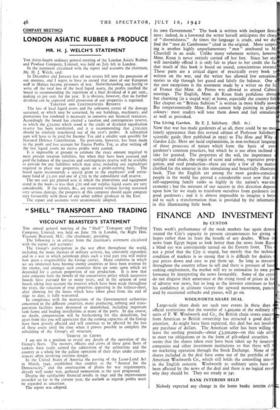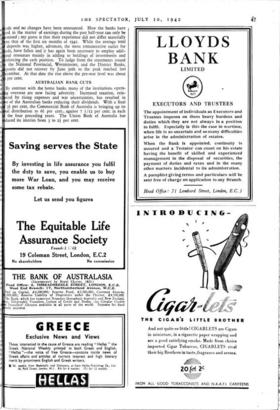FINANCE AND INVESTMENT
By CUSTOS THIS week's performance of the stock markets has again demo strated the City's capacity in present circumstances for giving hopes rather than its fears the benefit of any doubts. When news frg,rn Egypt began to look better than the news from Russ a blind eye was conveniently turned on the Eastern front. This not a proof that the City is stupid, but merely that the techni condition of markets is so strong that it is difficult for dealers put prices down and easy to put them up. So long as invest() throughout the country refuse to sell and there is pressure of fun seeking employment, the market will try to rationalise its own pe formance by interpreting the news favourably. Some of the cyn do not disguise their annoyance at the rising trend of prices in fa of adverse war news, but so long as the investor continues to ba his confidence in ultimate victory the upward movement, punc ated by occasional setbacks and pauses, will go on.
WOOLWORTH SHARE DEAL
Large-scale share deals are such rare events in these days official restrictions that the transfer of 1,400,00o of the ordinary 5 units of F. W. Woolworth and Co., the British chain stores conce from American to British ownership has attracted a good deal attention. As might have been expected, this deal has not involv any purchase of dollars. The American seller has been willing leave the sterling proceeds—about £3,5oo,000—on this side eith to meet tax obligations or in the form of gilt-edged securities. seems that the shares taken over have been taken up by insuran companies and other investment institutions so that there will no marketing operation through the Stock Exchange. None of shares included in the deal have come out of the portfolio of t American Woolworth Co., which still holds the controlling inter in the English concern. Woolworth 5s. ordinary units have been affected by the news of the deal and there is no logical rea why they should be. They are steady at 54s.
BANK INTERIMS HELD Nobody expected any change in the home bank interim rids and no changes have been announced. How the banks have ed in the matter of earnings during the past half-year can only be ised ; my guess is that their experience did not differ materially that of the first six months of 1941. While the average total deposits was higher, advances, the most remunerative outlet for ds, have fallen and it has again been necessary to employ addi- al resources mainly in adding to holdings of investments and inforcing the cash position. To judge from the statements issued , the National Provincial, Westminster, and the District Banks, posits did not recover by June 3oth to the peak reached last ecember. At that date the rise above the pre-war level was about per cent. AUSTRALIAN BANK CUTS By contrast with the home banks many of the institutions opera- g overseas are now facing adversity. Increased taxation, rein- ced by rising expenses and war uncertainties, has resulted in o of the Australian banks reducing their dividends. With a final 34 per cent. the Commercial Bank of Australia is bringing up its tal distribution to 64 per cent., against 7 1/12 per cent. in each the four preceding years. The Union Bank of Australia has uced its interim from 3 to 24 per cent.



























 Previous page
Previous page